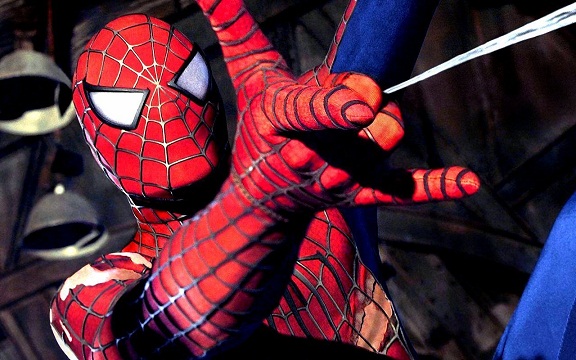“Ten years from now the combustion engine will be a thing of the past.”
Why it’s a left-wing film
Before we get to it, let’s point out one of the sweet ironies of “The American President.” What an amazing experience it is to watch a film written by Aaron Sorkin that relies heavily on the theme of condemning personal character attacks in the world of politics. You know, the very same Aaron Sorkin responsible for some of the most sexist and vicious personal character attacks on Sarah Palin we’ve seen in a while. Not only has the “West Wing” creator publicly ridiculed the Governor’s hair, makeup, intelligence, and hobbies, he’s gone so far as to label her as “deranged.”
But here’s where it gets interesting. According to Wikipedia, Sorkin admits to writing the warm, witty and charming “American President” screenplay “while often high on crack cocaine.” However, according to Sorkin, he’s now sober and was therefore sober when he viciously trashed Palin in the most personal ways imaginable. The only conclusion one is left to make then, is that Sorkin’s such a degenerate of a human being that the crack pipe had nowhere to go with his personality other than up.
Back to business…
“The American President” is a left-wing fairytale in which Global Warming exists, law-abiding citizens owning handguns is the cause of crime, the left-wing media (but I repeat myself) would aid and abet a damaging character attack against a sitting Democratic president during an election year, flag burning is a virtue, Republicans actually do sit around in smoke-filled rooms plotting diabolically, the American sheeple can be manipulated into turning against a widowed president who goes out on a date, and liberalism’s problem is not liberalism — not all the provably failed ideas that make up liberalism, but rather a lack of fight for those ideas.
Why it’s a great film
Director Rob Reiner’s winning and frequently moving love story between a sitting Democratic president Andrew Shepherd (Michael Douglas), a competent, patriotic, pragmatist with one eye on his approval rating and the other on re-election, and a hard-charging environmental lobbyist (Annette Bening), was a box-office disappointment at the time, grossing only $62 million. Eventually, however, it found an appreciative audience on cable and home video. And no wonder. Starting with a splendid cast, from the two main players straight through to Martin Sheen, David Paymer, and Michael J. Fox, Sorkin’s cleverly written and engaging script shows such a sentimental affection for his characters and their relationships (and America) that it’s contagious.
We might not agree with the characters, but they’re impossible not to like. And as far as the actual politics go, because the agenda feels natural in the hands of politically-engaged characters working in a White House setting, nothing (except maybe the closing Big Speech) comes off as strident or preachy. After all, it only makes sense for Democrat characters to believe in and make a case for Democrat ideas. And while today’s Hollywood is entirely too intolerant and close-minded to even consider making a film like this using sympathetic Republican characters, (though Nazis, terrorists and child molesters might have a chance), that doesn’t stop many of us in the loyal opposition from relating and sympathizing on a human level.
The story is also intentionally sly in holding off on the more partisan stuff until long after we’re completely invested in the central love story. By the time Richard Dreyfus shows up as the Republican villain all we want for our protagonists is for them to live happily ever after. Much of the credit for that has to go to Michael Douglas, who knocks it out of the park as the principled chief executive newly smitten and not really sure how to go around the trappings of his powerful office to buy a girl some flowers or pick her up for a date. Bening is just as good, a perfect match of awkwardness and awe (the couple’s early scenes together are priceless) until she emerges from the bathroom wearing only his shirt.
The film also succeeds in one of my favorite areas, taking us into a world we’re unfamiliar with and showing us how it all works. Hanging out at Reiner’s White House with his wonderful White House staff for a couple of hours is, well, fun. You don’t want to leave. And it all ends on a hopeful note, as well. Sure, the Prez gets the girl but only after telling the world he’s in favor of flag burning, digs the ACLU, about to violate the 2nd Amendment, and then tank the economy with an extremist energy bill.
If 2010 taught us anything, President Andrew Shepherd was a likely one-termer.
What’s not on the list
Reds (1980): If this were a top 50 or maybe even a top 30 list, director/star Warren Beatty’s epic retelling of the Russian Revolution would’ve ranked. Though beautifully filmed and containing a number of memorable scenes, as a whole “Reds” is, to be kind, imperfect, especially the third act. Too long, too stilted, and really only achieving greatness in the one scene where Emma Goldman (Maureen Stapleton — who along with Beatty’s direction won an Oscar) confesses that she’s lost faith in what the promise of the Revolution turned into in reality. And Beatty deserves credit for including this scene because in many ways it also questions his sympathetic approach as a director to the story itself.
I’m confident that somewhere in that 194 minutes there’s a great movie waiting to be found. This just isn’t it.
—–
This series is taking the holiday weekend off and will resume Monday. Merry Christmas to you all, Happy Birthday to Jesus, and a Happy Winter Solstice to our friends on the left.

